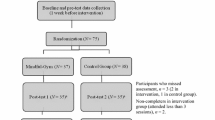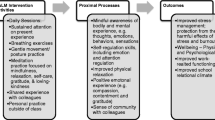Abstract
We assessed the effectiveness of an adapted mindfulness-based stress reduction (MBSR) program on educator stress and well-being. The study included 36 high school educators who participated in either an 8-week adapted MBSR program or a waitlist control group. Results suggested that educators who participated in MBSR reported significant gains in self-regulation, self-compassion, and mindfulness-related skills (observation, nonjudgment, and nonreacting). Significant improvements in multiple dimensions of sleep quality were found as well. These findings provide promising evidence of the effectiveness of MBSR as a strategy to promote educator’s personal and professional well-being. Implications and directions for future research are discussed.
Similar content being viewed by others
References
Allensworth, E., Ponisciak, S., & Mazzeo, C. (2009). The schools teachers leave: Teacher mobility in Chicago Public Schools. Chicago: Consortium on Chicago School Research. Retrieved April 5, 2013, from http://ccsr.uchicago.edu/publications/CCSR_Teacher_Mobility.pdf.
Baer, R. A., Smith, G. T., Lykins, E., Button, D., Krietemeyer, J., Sauer, S., Walsh, E., Duggan, D., & Williams, J. M. G. (2008). Construct validity of the five facet mindfulness questionnaire in meditating and nonmeditating samples. Assessment, 15(3), 329–342.
Bandura, A., Caprara, G. V., Barbaranelli, C., Gerbino, M., & Pastorelli, C. (2003). Role of affective self-regulatory efficacy in diverse spheres of psychosocial functioning. Child Development, 74(3), 769–782. doi:10.1111/1467-8624.00567.
Benjamini, Y., & Hochberg, Y. (1995). Controlling the false discovery rate: a practical and powerful approach to multiple testing. Journal of the Royal Statistical Society, Series B, 57, 289–300.
Benn, R., Akiva, T., Arel, S., & Roeser, R. W. (2012). Mindfulness training effects for parents and educators of children with special needs. Developmental Psychology, 48(5), 1476–1487. doi:10.1037/a0027537.
Bergin, C., & Bergin, D. (2009). Attachment in the classroom. Educational Psychology Review, 21, 141–170.
Boulet, J., & Boss, M. W. (1991). Reliability and validity of the Brief Symptom Inventory. Journal of Consulting and Clinical Psychology, 3, 433–437.
Brackett, M. A., Palomera, R., Mojsa-Kaja, J., Reyes, M. R., & Salovey, P. (2010). Emotion-regulation, ability, burnout, and job satisfaction among British secondary school teachers. Psychology in the Schools, 47, 406–417. doi:10.1002/pits.20478.
Buysse, D. J., Reynolds, C. F., Monk, T. H., Berman, S. R., & Kupfer, D. J. (1989). The Pittsburgh Sleep Quality Index: a new instrument for psychiatric practice and research. Psychiatry research, 28(2), 193–213.
Carlson, L. E., Speca, M., Patel, K. D., & Goodey, E. (2003). Mindfulness-based stress reduction in relation to quality of life, mood, symptoms of stress, and immune parameters in breast and prostate cancer outpatients. Psychosomatic Medicine, 65, 571–581.
Carson, R. L., Baumgartner, J. J., Matthews, R. A., & Tsouloupas, C. N. (2010). Emotional exhaustion, absenteeism, and turnover intentions in childcare teachers: examining the impact of physical activity behaviors. Journal of Health Psychology, 15(6), 905–914.
Cohen, J., Cohen, P., West, S. G., & Aiken, L. S. (2003). Applied multiple regression/correlation analysis for the behavioral sciences (3rd ed.). Mahwah, NJ: Erlbaum.
Cole, P. M., Martin, S. E., & Dennis, T. A. (2004). Emotion regulation as a scientific construct: methodological challenges and direction for child development research. Child Development, 75, 317–333. doi:10.1111/j.1467-8624.2004.00673.x.
Cullen, M., & Wallace, L. (2010). Stress Management and Relaxation Techniques in Education (SMART) training manual. Unpublished manual, Impact Foundation: Aurora, CO, USA.
Darling-Hammond, L. (2001). The challenge of staffing our schools. Educational Leadership, 58(8), 12–17.
Derogatis, L.R. (1975). Brief Symptom Inventory. Clinical Psychometric Research: Baltimore, MD.
Emmer, E. T., Stough, L. M., & Emmer, E. T. (2010). Classroom management : a critical part of educational psychology, with implications for teacher education. Educational Psychologist, 36, 103–112.
Galantino, M., Baime, M., Maguire, M., Szapary, P. O., & Farrar, J. T. (2005). Association of psychological and physiological measures of stress in health-care professionals during an 8-week mindfulness meditation program: mindfulness in practice. Stress and Health, 21, 255–261. doi:10.1002/smi.1062.
Gross, C. R., Kreitzer, M. J., Reilly-Spong, M., Wall, M., Winbush, N. Y., Patterson, R., et al. (2011). Mindfulness-based stress reduction versus pharmacotherapy for chronic primary insomnia: a randomized controlled clinical trial. Explore: The Journal of Science and Healing., 7, 76–87.
Grossman, P., Niemann, L., Schmidt, S., & Walach, H. (2004). Mindfulness-based stress reduction and health benefits. Journal of Psychosomatic Research, 57, 35–43. doi:10.1016/S0022-3999(03)00573-7.
Hamre, B. K., & Pianta, R. C. (2005). Can instructional and emotional support in the first-grade classroom make a difference for children at risk of school failure? Child Development, 76, 949–967.
Hofmann, S. G., Sawyer, A. T., Witt, A. A., & Oh, D. (2010). The effect of mindfulness-based therapy on anxiety and depression: a meta-analytic review. Journal of Consulting and Clinical Psychology, 78, 169–183. doi:10.1037/a0018555.
Ingersoll, R. M. (2002). The teacher shortage: a case of wrong diagnosis and wrong prescription. NASSP Bulletin, 86(631), 16–31.
Ingersoll, R., & Smith, T. (2003). The wrong solution to the teacher shortage. Educational Leadership, 60(8), 30–33.
Jennings, P. a., & Greenberg, M. T. (2009). The prosocial classroom: teacher social and emotional competence in relation to student and classroom outcomes. Review of Educational Research, 79(1), 491–525. doi:10.3102/0034654308325693.
Jennings, P. A., Snowberg, K. E., Coccia, M. A., & Greenberg, M. T. (2011). Improving classroom learning environments by Cultivating Awareness and Resilience in Education (CARE): results of two pilot studies. Journal of Classroom Interaction, 46(1), 37–48.
Jennings, P.A., Frank, J.L., Snowberg, K., Coccia, M., & Greenberg, M.T. (2013). Improving classroom learning environments by Cultivating Awareness and Resilience in Education (CARE): results of a randomized controlled trial. School Psychology Quarterly. doi:10.1037/spq0000035.
Johnson, L. C., Murphy, S. A., & Dimond, M. (1996). Reliability, construct validity, and scale norms of the Brief Symptom Inventory when administered to bereaved patients. Journal of Nursing Measurement, 4, 117–121.
Kabat-Zinn, J. (1990). Full catastrophe living: using the wisdom of your body and mind to face stress, pain, and illness. New York: Dell.
Kabat-Zinn, J., Lipworth, L., Burney, R., & Sellers, W. (1986). Four year follow-up of a meditation-based program for the self-regulation of chronic pain: treatment outcomes and compliance. Clinical Journal of Pain, 2, 159–173.
Kabat-Zinn, J., Massion, A. O., Kristeller, J., Peterson, L. G., Fletcher, K. E., Pbert, L., et al. (1992). Effectiveness of a meditation-based stress reduction program in the treatment of anxiety disorders. American Journal of Psychiatry, 149, 936–943.
Kabat-Zinn, J., Wheeler, E., Light, T., Skillings, A., Scharf, M. J., Cropley, T. G., et al. (1998). Influence of a mindfulness meditation-based stress reduction intervention on rates of skin clearing in patients with moderate to severe psoriasis undergoing phototherapy (UVB) and photochemotherapy (PUVA). Psychosomatic Medicine, 60, 625–632.
Kafetsios, K., Anagnostopoulos, F., Lempesis, E., & Valindra, A. (2013). Doctors’ emotion regulation and patent satisfaction: a social–functional perspective. Health Communication. doi:10.1080/10410236.2012.738150.
Kavanagh, D. J., & Bower, G. H. (1985). Mood and self-efficacy: impact of joy and sadness on perceived capabilities. Cognitive Therapy and Research, 9(5), 507–525.
Kristeller, J. L., & Hallett, C. B. (1999). An exploratory study of meditation-based intervention for binge eating disorder. Journal of Health Psychology, 4, 357–363. doi:10.1177/135910539900400305.
Ma, S. H., & Teasdale, J. D. (2004). Mindfulness-based cognitive therapy for depression: replication and exploration of differential relapse prevention effects. Journal of Consulting and Clinical Psychology, 72, 31–40. doi:10.1037/0022-006X.72.1.31.
Mashburn, A. J., Pianta, R. C., Hamre, B. K., Downer, J. T., Barbarin, O. A., Bryant, D., Burchinal, M., Early, D.M., & Howes, C. (2008). Measures of classroom quality in prekindergarten and children’s development of academic, language, and social skills. Child Development, 79(3), 732–749.
Maslach, C., & Jackson, S. E. (1981). The measurement of experienced burnout. Journal of Occupational Behaviour, 2, 99–113.
Meiklejohn, J., Phillips, C., Freedman, M. L., Griffin, M. L., Biegel, G., Roach, A. T., et al. (2012). Integrating mindfulness training into K-12 education: fostering the resilience of teachers and students. Mindfulness, 3, 291–307. doi:10.1007/s12671-012-0094-5.
Mikolajczak, M., Tran, V., Brotheridge, C. M., & Gross, J. J. (2009). Using an emotion regulation framework to predict the outcomes of emotional labor. In N. M. Ashkanasy, W. J. Zerbe, & C. E. J. Ha¨rtel (Eds.), Research on emotion in organizations: emotions in groups, organizations and cultures (pp. 245–273). Bingley, UK: Emerald Group.
Montgomery, C., & Rupp, A. A. (2005). A meta-analysis for exploring the diverse causes and effects of stress in teachers. Canadian Journal of Education / Revue canadienne de l’éducation, 28(3), 458–486. doi:10.2307/4126479.
Poulin, P. A. (2009). Mindfulness-based wellness education: A longitudinal evaluation with students in initial teacher education. Unpublished doctoral dissertation. University of Toronto, Toronto, Ontario, Canada
Poulin, P. A., Mackenzie, C. S., Soloway, G., & Karayolas, E. (2008). Mindfulness training as an evidence-based approach to reducing stress and promoting well-being among human services professionals. Mindfulness in Human Services, 46, 35–43.
Provasnik, S., & Dorfman, S. (2005). Mobility in the teacher workforce (NCES 2005-114). U.S. Department of Education, National Center for Education Statistics. Washington, DC: U.S. Government Printing Office.
Raes, F., Pommier, E., Neff, K. D., & Van Gucht, D. (2011). Construction and factorial validation of a short form of the self-compassion scale. Clinical psychology & psychotherapy, 18(3), 250–2555.
Randolph, P. D., Caldera, Y. M., Tacone, A. M., & Greak, M. L. (1999). The long-term combined effects of medical treatment and a mindfulness-based behavioral program for the multidisciplinary management of chronic pain in west Texas. Pain Digest, 9, 103–112.
Rimm-Kaufman, S.E., Pianta R.C., Cox, J.J., & Bradley, R. (2003). Teacher-rated family involvement and children’s social and academic outcomes in kindergarten. Early Education and Development, 14, 179–198.
Robinson, F. P., Mathews, H. L., & Witek-Janusek, L. (2003). Psycho-endocrine-immune response to mindfulness-based stress reduction in individuals infected with the human immunodeficiency virus: a quasi experimental study. Journal of Alternative and Complimentary Medicine, 9, 683–694.
Roeser, R. W., Skinner, E., Beers, J., & Jennings, P. a. (2012). Mindfulness training and teachers’ professional development: an emerging area of research and practice. Child Development Perspectives, 6(2), 167–173.
Shapiro, S. L., Bootzin, R. R., Fiqueredo, A. J., Lopez, A. M., & Schwartz, G. E. (2003). Journal of Psychosomatic Research, 54, 85–91. doi:10.1016/S0022-3999(02)00546-9.
Shapiro, S. L., Astin, J. A., Bishop, S. R., & Cordova, M. (2005). Mindfulness-based stress reduction for health care professionals: results from a randomized trial. International Journal of Stress Management, 12, 164–176. doi:10.1037/1072-5245.12.2.164.
Sutton, R. (2004). Emotional regulation goals and strategies of teachers. Social Psychology of Education, 7(4), 379–398.
Sutton, R. E., & Wheatley, K. F. (2003). Teachers' emotions and teaching: a review of the literature and directions for future research. Educational Psychology Review, 15, 327–358.
Tsouloupas, C. N., Carson, R. L., Matthews, R., Grawitch, M. J., & Barber, L. K. (2010). Exploring the association between teachers’ perceived student misbehaviour and emotional exhaustion: the importance of teacher efficacy beliefs and emotion regulation. Educational Psychology, 30(2), 173–189.
Weissbecker, I., Salmon, P. G., Studts, J. L., Floyd, A. R., Dedert, E. A., & Sephton, S. (2002). Mindfulness-based stress reduction and sense of coherence among women with fibromyalgia. Journal of Clinical Psychology in Medical Settings, 9, 297–304.
Williams, V. S. L., Jones, L. V., & Tukey, J. W. (1999). Controlling error in multiple comparisons, with examples from state-to-state differences in educational achievement. Journal of Educational and Behavioral Statistics, 24(1 ), 42–69.
Author information
Authors and Affiliations
Corresponding author
Rights and permissions
About this article
Cite this article
Frank, J.L., Reibel, D., Broderick, P. et al. The Effectiveness of Mindfulness-Based Stress Reduction on Educator Stress and Well-Being: Results from a Pilot Study. Mindfulness 6, 208–216 (2015). https://doi.org/10.1007/s12671-013-0246-2
Published:
Issue Date:
DOI: https://doi.org/10.1007/s12671-013-0246-2




